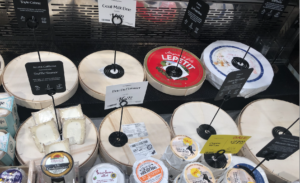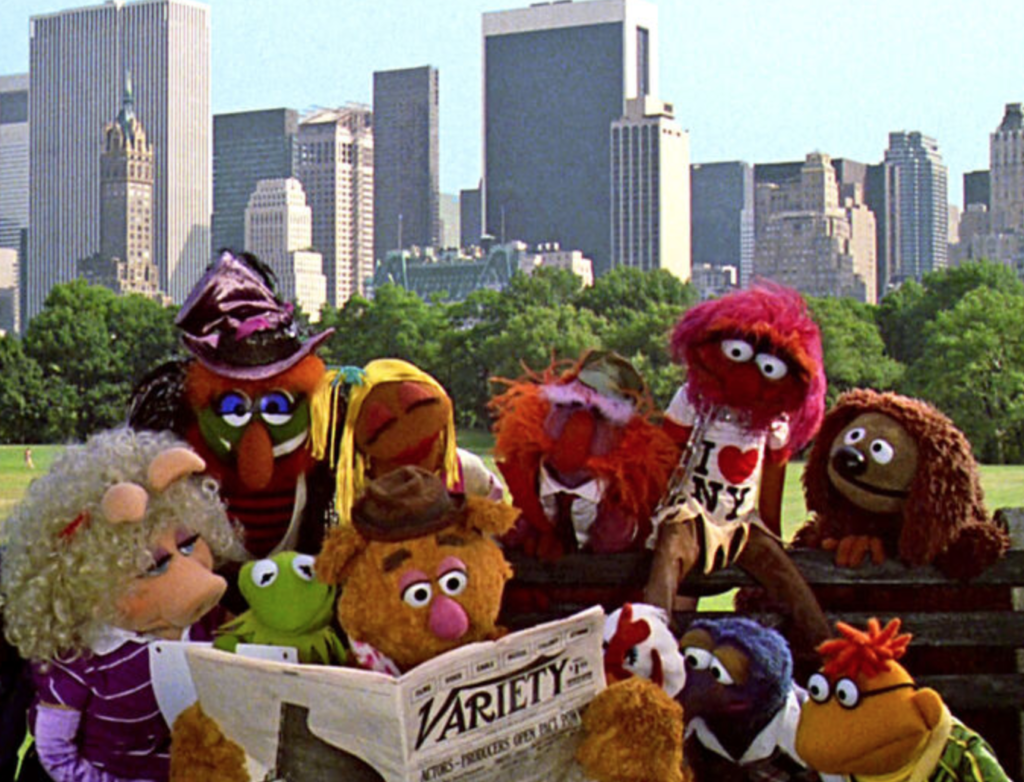 I had this really beautiful Wednesday where I saw long-lost friends everywhere—some on purpose, some roaming around the neighborhood, even a few from whom I’d been estranged for what reads now as absolutely small potatoes. Case in point: K, the Legend, and I had a perfectly cordial coffee at Oslo–something I couldn’t have imagined three months ago. Three weeks ago.
I had this really beautiful Wednesday where I saw long-lost friends everywhere—some on purpose, some roaming around the neighborhood, even a few from whom I’d been estranged for what reads now as absolutely small potatoes. Case in point: K, the Legend, and I had a perfectly cordial coffee at Oslo–something I couldn’t have imagined three months ago. Three weeks ago.
Overall the vibe was so terrifyingly end-of-the world, like everyone was making peace and exchanging IRL love before the COVID-19 anvil could come down for good. Even the pretty mild sunshine reminded me of the absolutely perfect weather of the morning of 9-11-01, right before the towers fell and people I loved died along with a trust I hadn’t known I’d taken for granted.
By Thursday, the vibe had changed enormously. In crowded grocery and drug store aisles, shoppers anxiously stuffed nonperishables into newly (and ironically) non-plastic bags. Some wore gloves, masks, hunched shoulders. Others stalked about in shorts and tee shirts, plenty of flesh exposed and eyes plenty guarded. By 8:30am lines were endless–snaking around city blocks, up and down stairwells. At Whole Foods I raised my eyebrows at a woman who looked more like me than anyone I’d ever met–long, broad bones; wide slash of a mouth; green eyes defined by bemusement and half-brows. It turned out she also was of Polish descent, only her family had come over in the 1990s, not the 1930s.
“I lived under USSR martial law,” she sang, shrugging her big shoulders. “I know about empty shelves and constant fear.” Then she winked.
She was such a sister from another mister that I wanted to hug her. But being one, she read my thoughts and inched away, face slammed shut.
———-
We are afraid of each other. We could kill each other. We need each other.
At core, these facts have always been true—-this is the human condition—-but in the five decades I’ve been on the planet, I’ve never felt it more acutely. Careless contact is lethal, and some won’t physically survive without others’ vigilance, courage, and compassion. Liking each other may not always be possible, but loving each other has become our only true hope–our currency, communication, and gravitational force.
There in that Whole Foods line I offered a prayer.
I pray for a healing path forward. I pray for this virus to be tamed post-haste. I pray for a better day soon. I pray that people in power proceed with the needs of all in mind. I pray to be able to embrace each of you crabapples soon.
—
The next day I woke in a well of anxiety–dark and dank. At first, I am sorry to say, I was fretting about money. Like every artist, freelancer, gig worker that I know, all income streams in my life have dried up–the film clubs where I lecture are cancelled, ditto for in-person readings. I worried about everyone who’d barely been making it before, the ones living check-to-check in an economy run by trash cans who don’t care about who and they waste.
Then I worried about what I’d do if I got sick–not surprisingly, I am radically un-insured and rumors are rising that COVID-19 has taken down many 40- and 50somethings as well. It didn’t help that my perimenopausal hot flashes read a lot like corona symptoms. But more I was worried about the elders in my life–beloved neighbors; Jan; my aunt and uncle; my parents, with whom I’ve been gently reestablishing contact since finishing a book draft.
I worried about the humanity of the young people playing the “Ok Boomer” card when faced with the prospect of endangering elders. The night before, I’d blocked a millennial love interest after they’d posted a rant about how the erasure of that generation would be “karmic.”
Callousness about the mortality of any group of people is bone-chilling. Just look at history– or today’s headlines, for that matter. Dissociation on any level but physical is the opposite of how we should be responding.
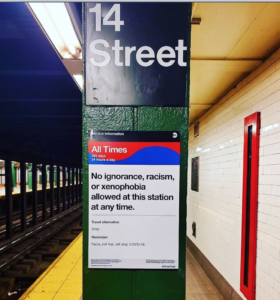 I thought of the sign I’d seen on what likely will be my last subway ride for a while. “No ignorance, racism, xenophobia allowed at this station at any time.” And the fine print: “Facts, not fear, will stop COVID-19.”
I thought of the sign I’d seen on what likely will be my last subway ride for a while. “No ignorance, racism, xenophobia allowed at this station at any time.” And the fine print: “Facts, not fear, will stop COVID-19.”
I may not be ecstatic about my country, but I am and always will be glad and grateful to be a New Yorker.
—-
As I lay in bed, I realized it was Friday the 13th, one of the most unfairly maligned days in mainstream life and one deemed powerfully positive by every tradition that honors the divine feminine.
In witch circles, Friday is always Venus Day–it’s named after the Norse Venus–and 13 is always a lucky number since there are 13 lunar cycles and–talk about the divine feminine–13 menstrual cycles in a given year.
With the grasping, greedy self-centeredness of end-stage cockocracy drowning us all, I meditated on directing this matriarchal magic at all who needed healing—not just from the illness wrought by COVID-19 but because from the financial hit so many are sustaining as a result. So many of us are who not going to make their nut in a month if this doesn’t let up.
I wanted to pull the covers over my head. And yet—
While we are social-distancing, we must find new ways to connect—to, dare I say it, love. So I got out of bed and put on some lipstick.
——–
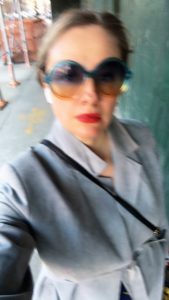 Later that day, I went for another walk, and observed the neighborhood had settled into a prevailing bittersweetness. Rather than than hug or fist-bump, my neighbors and I threw each grins, peace signs, Star Trek or Wakanda Forever salutes. Some even blew the kisses that could not be otherwise bestowed. The root of these communications was the root of the human condition. It was Sherwood Anderson’s “I have come to this lonely place and here is this other.”
Later that day, I went for another walk, and observed the neighborhood had settled into a prevailing bittersweetness. Rather than than hug or fist-bump, my neighbors and I threw each grins, peace signs, Star Trek or Wakanda Forever salutes. Some even blew the kisses that could not be otherwise bestowed. The root of these communications was the root of the human condition. It was Sherwood Anderson’s “I have come to this lonely place and here is this other.”
As I write these words, we have fully arrived in the future. The dystopia of end-state capitalism—of disease, environmental disrepair, and unimaginably cruel have-and-have-not-ness—has indisputably arrived. But so has the technology we could barely imagine three decades ago. These online networks and telecommunication devices that we’ve mostly cheapened and bemoaned are now our only real shore and oar (once we disinfect them).
They are how we’re holding each other.
Thus is the slap and tickle of evolution, adaptation–what adrienne maree brown refers to as emergence. We have been socialized to understand that “constant growth, violent competition, and critical mass are the ways to create change.” But that what we really require for thrival, not just survival are “deep and authentic connections.”
On this sunny lonely March day as I pass people I cannot embrace, as I cry for people four thousand miles away, I feel the reality of being alive in 2020 most acutely. We can tug upon these threads that connect us—the Internet and Indra’s Net— but literally cannot extend a hand.
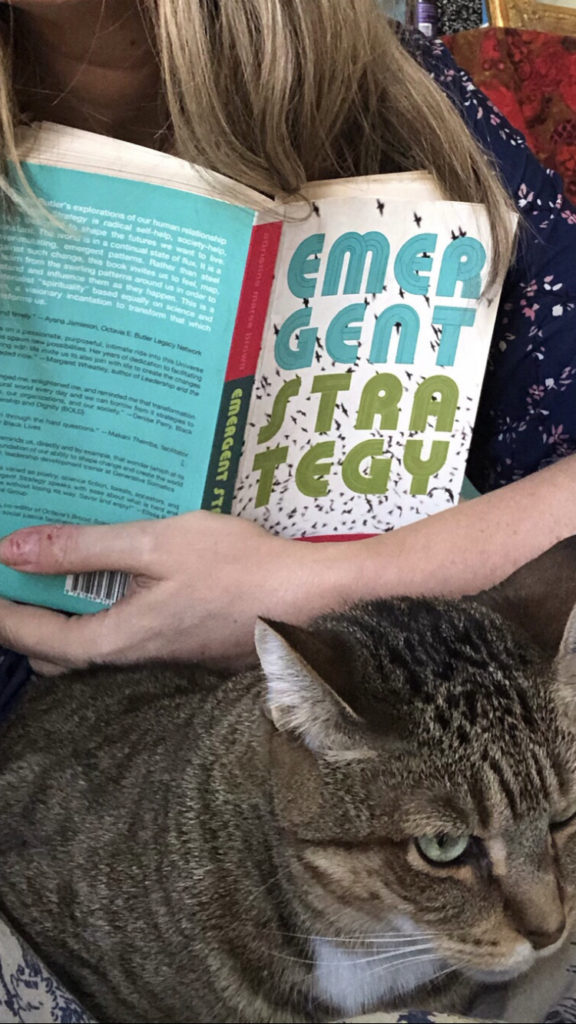 So trust your gut, just say no. Postpone the obligations and the fun. Develop good boundaries that protect us all. (Good boundaries always do.) And draw upon the technology we’ve developed and the intuition we barely acknowledge.
So trust your gut, just say no. Postpone the obligations and the fun. Develop good boundaries that protect us all. (Good boundaries always do.) And draw upon the technology we’ve developed and the intuition we barely acknowledge.
For now is the time to learn and listen. To use any tool, pursue any path that advances less transactional, more spiritually collaborative modes of living. We must grow–but as hothouse flowers, especially here in NYC, where only the very lucky have access to private outdoor spaces. We must express radical empathy telepathically–telempathically!–rather than in person.
Because if you’re reading this, I want to be able to hug you when a better day in this country and world comes again.
Love is how we will emerge back into the world.

